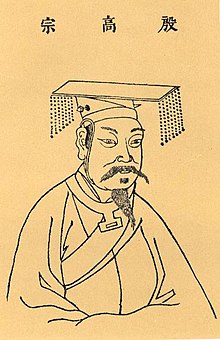
Back Wu Ding BS Wu Ding Catalan وو دینگ CKB Wu Ding Danish Wu Ding German Wu Ding Spanish Wu Ding French Vu Ting Hungarian Wu Ding ID Wu Ding Italian
| Wu Ding 武丁 | |||||||||
|---|---|---|---|---|---|---|---|---|---|
 Portrait of King Wu Ding of Shang from Sancai Tuhui | |||||||||
| King of Shang (c. 1600 - 1046 BC) | |||||||||
| Reign | c. second half of the 13th century BC | ||||||||
| Predecessor | Xiao Yi | ||||||||
| Successor | Zu Geng | ||||||||
| Chancellors |
| ||||||||
| Born | c. first half of 13th century BC Shang dynasty | ||||||||
| Died | c. 1200 BC Yin | ||||||||
| Spouse | |||||||||
| Issue | Zu Ji | ||||||||
| |||||||||
| Father | Xiao Yi | ||||||||
| Religion | Shang state religion | ||||||||
Wu Ding (Chinese: 武丁; died c. 1200 BC); personal name Zi Zhao (子昭), was a king of the Chinese Shang dynasty who ruled the central Yellow River valley c. 1250 – 1200 BCE. He is the earliest figure in Chinese history mentioned in contemporary records. The annals of the Shang dynasty compiled by later historians were once thought to be little more than legends until oracle script inscriptions on bones dating from his reign were unearthed at the ruins of his capital Yin (near modern Anyang) in 1899.[2] Oracle bone inscriptions from his reign have been radiocarbon dated to 1254–1197 BC ±10 years,[3]: 165 closely according with regnal dates derived by modern scholars from received texts, epigraphic evidence, and astronomical calculations.[3]: 172
Wu Ding's reign is considered one of the most prosperous period of early ancient Chinese civilization. Spanning from the mid 13th century BC to the early 12th century BC, the era saw the appearance of the earliest Chinese writing as well as technological developments. Ancient Chinese culture flourished, and, through its religious and artistic aspects, left an important legacy. The spiritual beliefs along with social structure from his reign passed down to the Zhou dynasty, which would later embrace and further develop them into unique features of classical Chinese society. It was also this time that the Shang kingdom increased their territorial extent greatly, and experienced one of the most glorious time in the second millennium BC. Due to successes in wars with neighboring tribes and annexation of dependent chiefdoms, the Shang expanded away from its heartland and increased its influence on once-distant tribal peoples.
In classical Chinese historiography, Wu Ding is often depicted as a meritorious king. The narrative of Wu Ding in Zhou traditional history books features elements of the Mandate of Heaven (and the associated concept "Son of Heaven") which only appeared two centuries after Wu Ding's time. He appeared in various conversations as the Son of Heaven, being addressed by his relatives and ministers. Zhou romanticization of his life, although having misinterpreted Wu Ding as being influenced by their ideology, has the effect of portraying him as a model of an ancient virtuous ruler of a kingdom.
- ^ Boileau (2023), p. 314.
- ^ Bai Shouyi (白壽彝), ed. (2002). An Outline History of China. Beijing: Foreign Language Press. ISBN 7-119-02347-0.
- ^ a b Cite error: The named reference
radiocarbonwas invoked but never defined (see the help page).
Cite error: There are <ref group=lower-alpha> tags or {{efn}} templates on this page, but the references will not show without a {{reflist|group=lower-alpha}} template or {{notelist}} template (see the help page).
© MMXXIII Rich X Search. We shall prevail. All rights reserved. Rich X Search